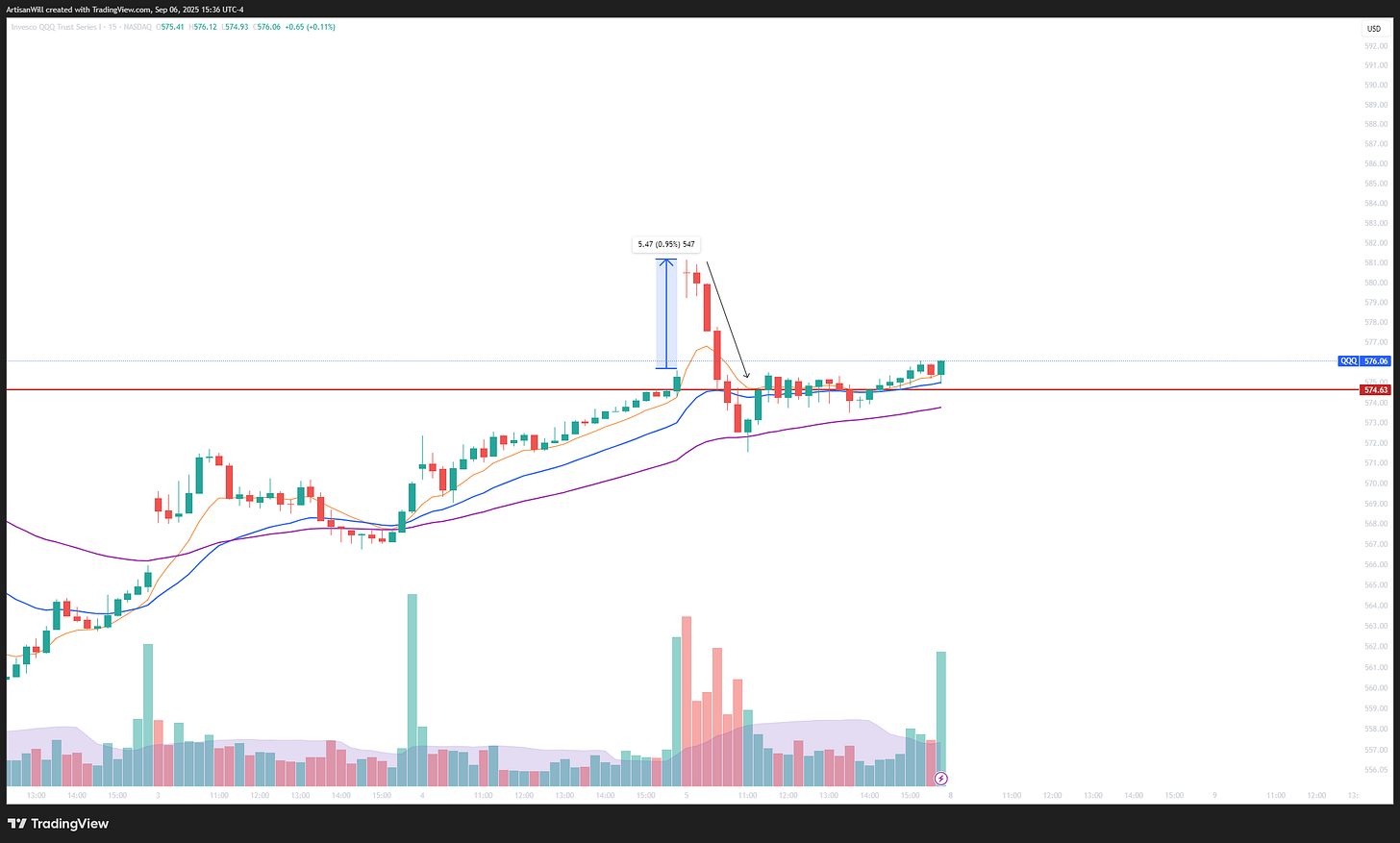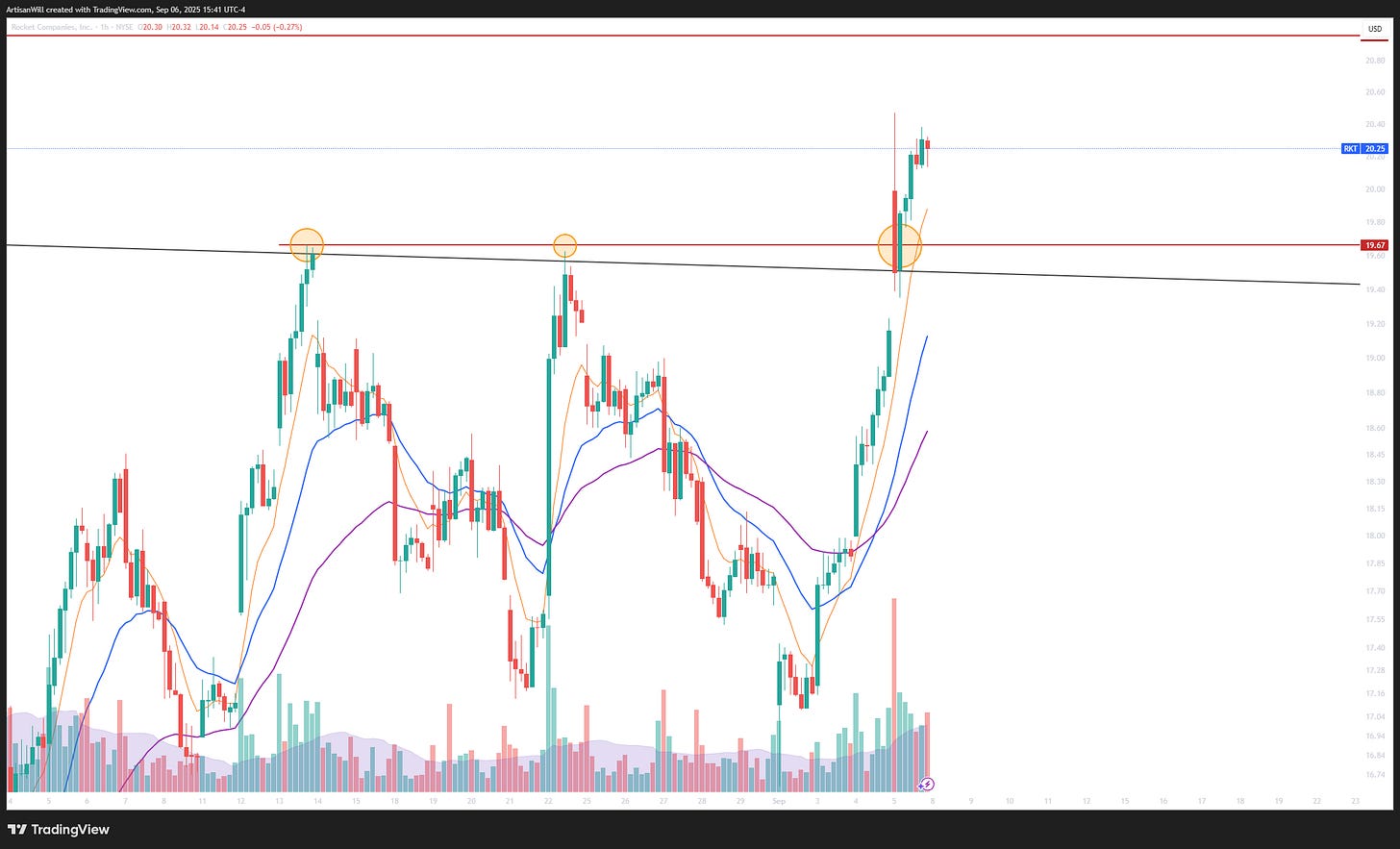Common Trading Mistakes
The Mental Game Comes First
Welcome back to another edition of The Dividend Journal! And if you’re new here, welcome in and hope you stay for a while :)
In trading, your mentality is your edge. How you manage your mentality determines the longevity of your trading. Technicals and fundamentals matter, but your execution in the market determines your results. Here are some of the most common mentality mistakes that traders make and how to avoid them.
TLDR:
Plan Trades Instead of Chasing
Don’t overtrade from boredom
Practice good risk management
Don’t have a bias
Avoid revenge trading
Have realistic expectations
Don’t compare your progress
1. Chasing Instead of Planning
Too many traders jump into moves after they’ve already run. Chasing green candles or panic selling into red ones is the surest way to bleed capital.
A common mistake is trading the first 15-30 minutes of market open. This tends to be where markets are most volatile (outside of power hour in the afternoon). The first 30 minutes of market open is great for taking profit, not entering new positions. If you swung positions over night, market open is a great time to trim profits. Option premiums are inflated from higher volatility at market open, and I almost always use the morning to take some profits off the table.
SPY 0.00%↑ below from 9/5/2025 shows an almost 1% gap up at open. If you chased this open thinking we would get continuation, you would have not only paid extra for higher volatility but you also would have bought the top.
The first 30 minutes of market open should be observation time and even if a stock bursts past your trigger for entries, it will almost always have some type of pullback later in the day for your entry.
RKT 0.00%↑ trigger for me was a break past 19.67 because this price area has been a point of contention. We gapped up past the trigger at market open, but we pulled back and retested the breakout spot almost perfectly.
Rather than entering right at the open, catching the pullback lets you capture a better risk to reward trade and the option premiums will have settled down.
Successful traders anticipate setups and plan their entries and exits in advance. Discipline beats FOMO every time.
2. Overtrading for Action
Markets reward patience, that’s why long term portfolios do so well. Over time, buying and holding tends to outperform. Trading follows the same principle in different font: no action until the setup you are looking for presents itself in the market.
Most traders hate boredom. They trade for action, not opportunity. So many people talk about being disciplined but trade just to get a dopamine rush. Also, there is no benefit to trading just to feel like you’re doing something. In most parts of our lives, more work equates to more results. In trading, it’s the exact opposite.
Less is more.
I come back to this mantra every day. The hidden danger of overtrading is that it rewires your brain to seek dopamine hits instead of calculated executions. You start to confuse frequency with productivity, when in reality the exact opposite is true.
The number one rule for trading is capital preservation, not capital growth. One A+ setup a week can pay more than ten sloppy trades in a day.
3. Ignoring Risk Management
The fastest way to blow up an account is to ignore position sizing and risk management. Risking 50% of your account on a single play might feel exciting, but one mistake can take you out of the game. The flashy gains people post on social media and on wallstreetbets are enticing but you have to remember all of that is just gambling.
My rules:
5% of account value max risk per position for full size
2.5% of account value max risk per position for half size
1% or less for lottos
Furthermore, risk management isn’t just about stop losses. It’s about creating a system that ensures survival and sustainability. The best traders risk a consistent calculated percentage per trade so that even a string of losses won’t cripple them. You must also understand correlation: stacking too many positions in the same sector or theme is hidden leverage. Swinging positions in AVGO 0.00%↑ and MU 0.00%↑ into NVDA 0.00%↑’s earnings report would be over exposed to one sector. Treat risk management as your insurance policy. Without it, you won’t be trading for a long time.
4. Anchoring to Biases
Traders love being “right.” Somewhere along the line, people get so fixated on being right that they’d rather stroke their ego than make money. They’ll marry a stock, a sector, or a thesis and ignore the evidence when sentiment shifts.
Mark Douglas in “Trading In The Zone” talks about how the market doesn’t care about your ego. The stock market is just numbers and has no emotions. The emotional reactions in the stock market is what leads to opportunities, it’s up to you to position yourself appropriately to take advantage. Adaptability is what separates consistent traders from stubborn ones.
Anchoring shows up in subtle ways like refusing to sell because you “just know it’ll come back,” or only looking for bullish confirmation when you’re already long. This mental rigidity blinds you to changing conditions and before you realize it, you’re down -80% on a trade. When you break out of your anchored bias, you unlock fluidity with the market.
I’ve seen people get very confused wondering why “this strategy has been working for the past two weeks but now it’s not working at all.” The fantastic part about the stock market is that it is constantly evolving. Every event in the stock market is unique and never happens again. What worked last month may not work now. Staying flexible means you trade what’s in front of you, not what you want to be there.
5. Revenge Trading
Nothing kills an account faster than emotional revenge. After a loss, many traders double down or force trades to “make it back.” This usually compounds mistakes. And if you’re rewarded for doubling down, this result reinforces the bad habit of revenge trading. It’s not a matter of if but when you blow up your account with revenge trading. The difficult skill to develop is knowing when to step away, reset, and come back clear headed. But I promise you, the market will always be here.
Revenge trading is fueled by pride and emotion, two of the most dangerous forces in markets. Instead of accepting a loss as part of the game, you try to be right through reckless size and poor setups. Most people would rather sell a winning trade than cutting a losing trade because you have to admit to yourself that you were wrong. In actuality, you need to be doing the opposite: hold your winners longer and cut your losers faster.
After a hefty loss, I always take the rest of the day off. Nothing productive will come out of continuing to trade trying to make back the loss. The goal isn’t to win back money. The goal is to trade well. If you focus on execution, profits eventually follow naturally.
6. Unrealistic Expectations
When I made my first $5,000 in the stock market within a week, I thought I had found the secret in the matrix and I was going to be able to quit my job.
…This of course led to me losing the five grand and then some.
The reality is that trading is a grind of small wins, controlled losses, and occasional big runs. In fact, trading as your sole income is probably one of the worst jobs to have. I have found that it puts too much pressure on the money you’re risking and then traders struggle to detach themselves from their trades.
The infamous quote “90% of traders lose money” isn’t derived from any official data but it probably isn’t far from the truth. A 2020 study on Robinhood investors actually show that average returns were reliably negative.
Trading IS hard.
If trading wasn’t hard, we would all be multimillionaires. The theoretical “90%” ropes in day traders, traders who quit and those who are just gambling.
I don’t set a specific number as my profit target for the week or month. I try my hardest to just trade my system and extract as much as possible from what the market is giving.
7. Comparing to Others
Comparison is the thief of all joy. Scrolling through X or TikTok and seeing highlight reels of other traders’ wins can wreck your mindset. Comparison breeds impatience and envy. Impatience chips away at your mental capital and inevitably fosters bad trading habits.
I can’t tell you how many times I’ve had a great trading day only to become jaded about my progress once I see how much money others have made on social media. I remind myself that I’m not on the same trading path as the people I see online. If anything, it’s a humbling reminder that there will always be a bigger fish so it’s best to not get too cocky.
Focus on your own system, your own progress, and your own P&L curve, not someone else’s screenshot.
Final Takeaways
The market is a mirror. It reflects your discipline, patience, and ability to control yourself. The outliers that stay consistently profitable are the traders that take their mentality as seriously as their setups. I’ve always told my mentees that the profits will come as a byproduct of good trading. Master your mindset, and the rest follows.





